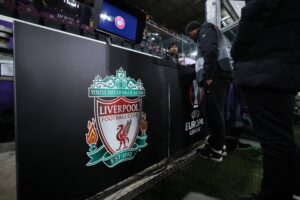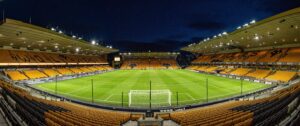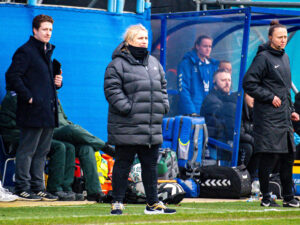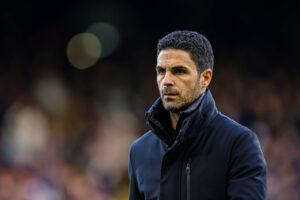Welcome to Last Word on Football’s ‘Returning Players’ Series. In this edition, we take a look at Glenn Murray.
Murray arrived at Brighton & Hove Albion for his first spell with the Seagulls in January 2008 which lasted for three-and-a-half years, leaving in July 2011.
Five years later, the frontman was back on the south coast after initially returning to the club on a season-long loan from Bournemouth – a deal that was made permanent in January 2017.
Returning Players – Glenn Murray
First Spell at Brighton
Murray was first brought to the club by Dean Wilkins at the turn of 2008 and joined a very different Brighton & Hove Albion to the one we know today.
The Seagulls were in League One and halfway through their ninth season at their temporary home of Withdean Stadium, otherwise known as the ‘Theatre of Trees’ in reference to the abundant flora behind the temporary south stand.
Planning for a brand-new state-of-the-art stadium at Falmer had only been granted just four months previously after a long struggle to give the club a permanent new home, and the Premier League still felt like a long way away.
Murray was brought in to add goals and add fresh impetus to Albion’s push for the League One play-off places, and his exploits in League Two with Rochdale caught the eye of Wilkins.
He netted 26 goals in 56 appearances across all competitions for the Greater Manchester side, and Brighton paid in the region of £300,000 for his services.
The forward netted his first goals in the blue-and-white stripes with a brace in a 3-0 victory at home to Crewe Alexandra and scored a further seven times that campaign, leaving Murray with nine goals from 21 appearances.
Alas, his impact was not enough to propel Albion into the top six and finished seven points adrift of the play-off places.
It was all change that summer as Wilkins departed and the popular Micky Adams returned for his second spell in the managerial hot seat.
Murray got off to an impressive start in his first full season after scoring seven goals in his first ten appearances, including a first hat-trick for the club in a 3-3 draw with Cheltenham Town.
But a series of injuries in a frustrating campaign coincided with Albion’s slide down the table, costing Adams his job and Russell Slade being recruited to steer the side to safety on the final day of the season. Nevertheless, Murray still managed an impressive 12 goals in 27 appearances across all competitions, despite being dogged by injuries.
The 2009/10 season saw more change with Gus Poyet replacing the sacked Slade that November and Murray netted a further 14 goals in 36 appearances, which included his only four-goal salvo for the club in a 5-2 win away at Wycombe Wanderers.
An unremarkable 13th-place finish followed that May, but the season arguably propelled Albion on their journey to the Premier League after romping to the League One title in 2010/11.
It proved to be the final season of Murray’s first spell at the club, but he departed on a high with 22 goals in that title-winning season.
He finished second behind Craig Mackail-Smith in the League One list of top goalscorers, but despite the prospect of playing Championship football at Albion’s new state-of-the-art stadium, Murray rejected a new contract offer and joined Crystal Palace.
Teams That Murray Played for In Between
Murray linked up with a Palace side managed by former Eagles forward Dougie Freedman and netted his first goal in a 1-1 draw at home to Blackpool.
But it proved to be an underwhelming first season in south London for both Palace and Murray – the Eagles finished 17th in the Championship and the former Seagull managed just six league goals.
One of those goals came in a 3-1 win away at Brighton, and despite being jeered every time he touched the ball, Murray refused to celebrate as a mark of respect for his former club.
He may have been left to ponder what might have been, as the Seagulls finished ten points and seven places better off than Palace after being in contention for a play-off place for much of the season.
However, Murray needn’t have worried about what was to come and scored 30 league goals to become the Championship’s top scorer in 2012/13, including a brace in a 3-0 win over Brighton.
Palace ended the season in fifth and three points behind Brighton, but Murray and his new club had the last laugh with a 2-0 aggregate victory in the play-off semi-finals before beating Watford in the final.
The frontman missed the semi-final second leg and final with a cruciate ligament injury to provide the cruellest end to a fantastic season.
Murray worked his way back to fitness for the second half of the following campaign and was sent out on loan to Reading in September 2014 in a bid for regular game time. The striker managed to score against Brighton again whilst with the Royals, netting a brace in a 2-2 draw at the Amex.
Murray scored seven Premier League goals that season after returning to Palace in January 2015 but moved back to the south coast that year – this time to link up with newly-promoted Bournemouth.
But it was to be an unhappy spell at the Vitality Stadium, and a lack of consistent game time under Eddie Howe contributed to a largely disappointing campaign in 2015/16. He found the net only five times in 25 games across all competitions, which came ahead of a return to Brighton.
Return to Brighton for Glenn Murray
Murray’s much-publicised return to the Seagulls came in July 2016, and the striker said he had ‘unfinished business’ with the club.
The 2016/17 campaign proved to be another vintage Murray season and he plundered 23 league goals to secure Albion a place in the Premier League for the first time, ending their 34-year wait for top-flight football.
There were so many highlights in an unforgettable season; from a hat-trick in a 5-0 mauling of promotion favourites Norwich City, the last-minute winner in a dramatic 2-1 win away at Birmingham City and a goal in the 2-1 win over Wigan Athletic that was enough to secure automatic promotion.
Murray had more prolific seasons in front of goal, but this was arguably the most significant of his career to date.
In the Premier League, Murray netted 12 goals on his return to the top flight, helping the club to a respectable 15th-place finish.
Among the highlights were a brace in a 3-0 victory away at West Ham United and a goal in a 2-1 win over Arsenal at the Amex – Albion’s first win over one of the so-called ‘big six’ clubs.
He also found the back of the net in a 2-1 win over Crystal Palace in an FA Cup third-round tie at the Amex and scored against the Eagles again in a 3-2 Premier League defeat at Selhurst Park.
As the goals kept coming, there was talk of Murray chasing down Tommy Cook’s record of 123 goals and the prospect of him becoming the club’s all-time top goalscorer.
He became only the second player to score a century of goals for the club after netting the winner in a 1-0 victory over Wolverhampton Wanderers in October 2018. Murray found the net 15 times in all competitions, which also saw him net a brace in a 3-1 extra-time victory over West Bromwich Albion in the club’s run to the FA Cup semi-finals.
Despite a respectable season from a personal perspective, Albion secured Premier League survival in 2018/19 by the skin of their teeth and ultimately cost Chris Hughton his job.
Graham Potter was his replacement and Murray lost his place in the line-up to the likes of Aaron Connolly and Neal Maupay in the new season.
He scored what turned out to be his 111th and final goal for the club to earn the Seagulls a point in a thrilling 3-3 draw away at West Ham, leaving him 12 goals adrift of Cook’s record.
A loan move to Watford in September 2020 signalled the end of the road for Murray at Brighton, before he switched Championship clubs to link up with Hughton again at Nottingham Forest.
The all-time goalscoring record may have ultimately alluded Murray, but few would argue with his legendary status in two stellar spells at Brighton.
Main Photo






